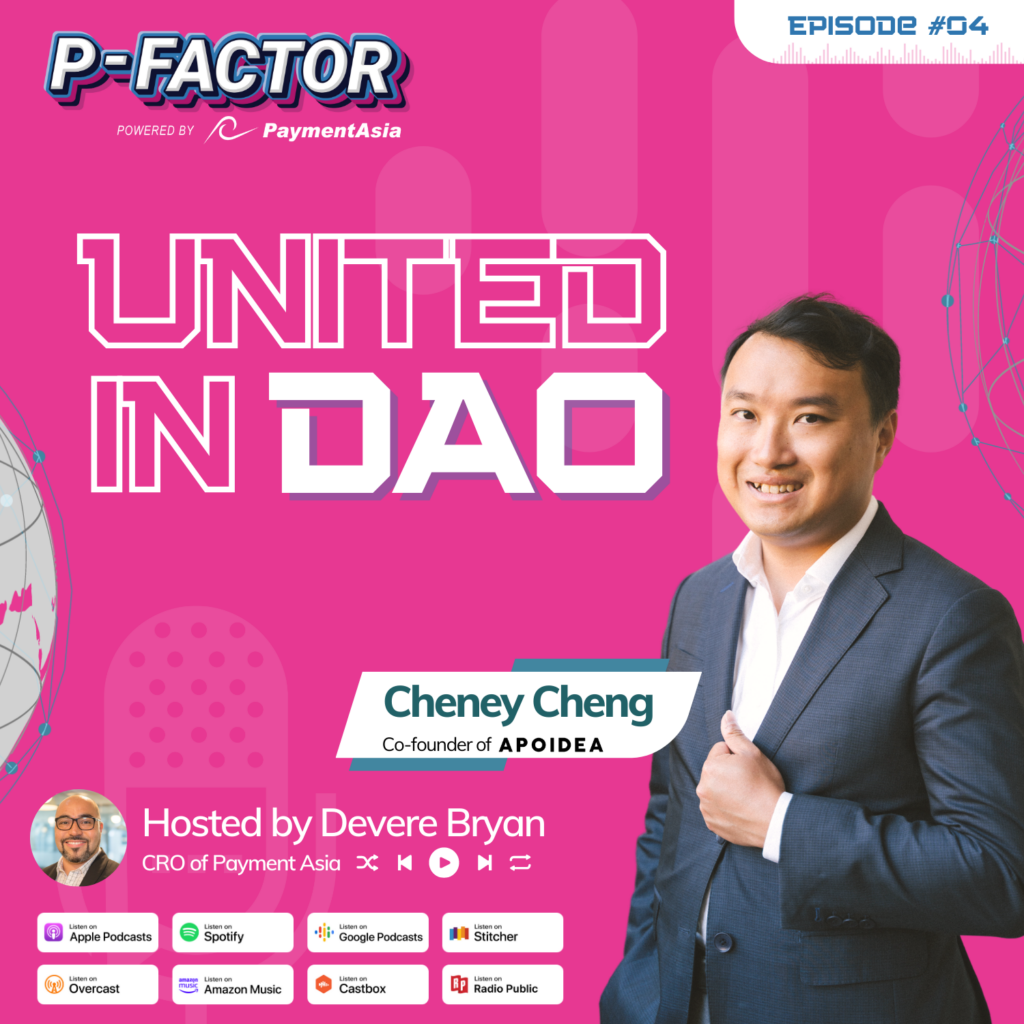Devere: Welcome to the P-FACTOR. Today we have Cheney Cheng who’s here from Apoidea. Welcome Cheney.
Cheney: Thank you, Devere.
Devere: Really excited to hear more about the business, more about what you’ve built. The name Apodia, where does the origin of that come from? It’s such an interesting name.
Cheney: Of course, as Jeff Bezos. So says, every company starts with A is a good company so that’s why I would name it after A. But then if we go back to the origin of the word, it’s actually Latin in class of bees,
It’s kind of a biological word.
We believe that what we are doing is gathering important information, distilling it, making the honey that everyone loves and we’re also like in our culture we always refer to bees as hardworking and then usually work as a team. So because like that goes back to our company’s main business where we have been doing AI and blockchain as our two legs. And we believe they are like the Yin and Yang in the Chinese concept. We believe we want to leverage AI to make humanity more efficient.
Devere: I love that, you know, creating a community off the back of the decentralised blockchain structure. Hey, and you know, you built a sweet business there off the back of the honey concept as well. When you break these businesses down, like how do you separate them? Which, who are your customers in each area that you work with?
Cheney: Sure, so we actually have four business units right now. We run an online media that everyone can read and then we serve the advertisers. We have an AI solution business that sells AI solutions to banks, automation SaaS that can streamline their process. We have a SFC licence that as a manager called Altive which helps empower high-end individuals that have more access to alternative investment, and with the Web 3 unit which develops decentralisation tools for the crypto community, and our vision is a blockchain is not just for a small group of people, it should be for everyone. So we are trying to push for the mass adoption of blockchain technology as well.
Devere: Wow, there’s so much there. I think we won’t have time to go into every area. Maybe today with the vast changes in Hong Kong being such a hot topic, let’s focus on the Web 3 area and maybe get into the blockchain piece. So What is your, actually, you know just for the audience here, what’s your description of blockchain? Like what is it and how do you utilise it?
Cheney: I would say like, there would be a lot of fancy descriptions around what blockchain really is for me. I think it’s very straightforward but it’s also very straightforward that we should all remember deeply. Blockchain, after all, is a database. It’s just a database that nobody can change the record of. So there is no trust issue on the records on that. So after all like, blockchain can be like, people describe blockchain as many other things but then from what I see, blockchain only solves one problem and one problem only, trust.
Indeed it is bad in many other things. It’s a very slow database. It’s a database that can’t be scalable. It’s a database that can store a lot of data. After all, it’s very slow because it requires consensus from thousands, hundreds of thousands of computers to verify the record. So it’s a costly database. We have to say it this way. So I guess it goes to the point that blockchain is here to solve trust issues that would be even more costly in human society to protect.
For example, we need a bank to help us save our money because otherwise it would be stolen in a property purchase deal, because as a buyer you don’t trust the seller, you won’t just send your money to the seller’s account. It takes months to verify the property or like to transfer the ownership record in the government database. That’s why you keep the money with the lawyer. These are all the trust issues we’re facing day to day and we’ve been spending quite a lot of money on lawyers to help save the money. This stuff is worth the exploration of blockchain but then there are many other issues that may not have the big enough trust issues for us to solve and those cases probably don’t need blockchain.
I think it’s a big topic in the crypto or blockchain community, whether like: are we overbuilding things on the blockchain? That would be a big topic and I guess the whole community is still exploring the right way.
Devere: That’s great to know and I think maybe as we get into it, maybe we can go back and have a look at macroeconomic impacts that you see in Asia and specifically in Hong Kong with blockchain adoption now with the vast changes coming in. But Bringing it back to a podium, so I want to lean into the piece you mentioned at the end there around decentralisation and community. I know you have a product called CoffeeDAO. How does that work and how do you bring decentralisation into a productized position?
Cheney: Sure, CoffeeDAO represents a vision I have around blockchain decentralisation. First of all, let’s talk about DAO. DAO means decentralised autonomous organisation. It’s a vision that people can interact on blockchain as an organisation, as a group. People make decisions through the use of smart contracts or through voting. So like all those governance records would be binding, not by legal terms but by programming codes. That helps organisations to grow further and to support everyone in the organisation to contribute and be rewarded. And on that part, as an economic student, I’ve always been like, I always love the concept around cooperative. In Europe, there are farmers cooperatives, there are worker cooperatives. Indeed, there is a coffee shop in Italy also called Coop. It’s a chain of coffee shops run by ladies and they have been supporting each other and forming a kind of a network.
Devere: Is it a community?
Cheney: It’s a community and of course, 100, 200 years ago, they didn’t have blockchains so they just called it Coop. But nowadays, because we have the technology, we make it more fancy and nerdy. That’s why we call it autonomous and call it DAO. But I think it’s the same thing. And for me, I’m a coffee lover. I love coffee shops. I love visiting all those independent coffee shops. But I also realise independent coffee shops don’t have the resources to really compete with large coffee shops like Starbucks or in Hong Kong like the PCC. They don’t have the marketing resources. They don’t have those HR, finance, and all those backbone to support them to grow healthier.
And I feel like that’s a challenge that, supposedly, blockchain can bond everyone together and get them to grow better. That goes to a concept that I really want to experiment with which is a decentralised business alliance. So that’s why CoffeeDAO is indeed a decentralised business alliance for independent coffee shops, which I see that blockchain is likely the way that makes it finally making sense.
Business alliance, again, is not a new concept. Everyone has a membership in either the One World or SkyTeam, like all those airline alliances. But then you probably wouldn’t also notice that it seems that only the really big cop alliances would work. The airline alliances would only have like 30 to 50 gigantic airline companies. But It seems, business alliances never work for hundreds of thousands of small shops. I guess the issue here is obvious, trust. It’s kind of not easy for 50 corporations to trust each other. Actually, it’s not that easy, but then they have a big enough interest to trust each other. They may even sell independent organisations as the alliance entity to help manage coordinator members.
But then you probably could imagine that, without the help of technology, you really can’t bond 10 ,000 coffee shops together. But then blockchain gives us the chance. That’s why I see that blockchain is giving us a very unique opportunity to bond thousands or hundreds of thousands of small shops together, and support each other, and make each other do better.
Devere: That’s amazing. So lots to unpack there. When I think back to it, you talked about how the blockchain creates trust, and transparency, and is the underpinning platform for the businesses to rely on. But how does the loyalty program work? How does the actual CoffeeDAO product intertwine one coffee shop to another coffee shop?
Cheney: Sure. So CoffeeDAO is a decentralised business alliance, but it’s also a loyalty program. There is a coffee token which represents a single shop expression. That’s the basic rule of the whole game. And for any coffee shops to join the CoffeDAO, they just have to commit to this ratio. So hopefully what we want to do is, we want to create a token that is to be used to be set up but not to be speculated. I’m kind of, contrarian to a lot of the things in the industry. One thing is I tend to believe like the blockchain that was there to facilitate transactions. And if a token has its value fluctuates too much, it’s not helping transactions. So that’s why I kind of like, pack it with something very visual and concrete, which is again, a single shot of espresso. Hopefully it will create a very crystal clear value of what it means.
And I guess the beauty here is for the coffee shop owners, they actually don’t even mind if they can’t get any like, fiat or cash back from the coffee tokens. For them, it’s a chance for them to promote their shops, to win customers, to let them show up in front of the storefront. As soon as the customers show up, whether it’s a single shop expression or whatever, they don’t care that much. Or like they would bet on the fact that customers don’t usually come in for a single shot of espresso. They will come in to upgrade the drink to be a glass of latte or they will like to pair it with a croissant in the morning.
As soon as you also pay them something in cash, they win. So this network is actually also a network of affiliate marketing, it’s a network of promotion.
Devere: It’s almost gamifying it to a certain degree. I love it. And obviously, earlier on this month, we’re recording this in June, the vast changes came in Hong Kong. How does that change your approach? Obviously now we have the opportunity for this to become retail, so people can invest in tokenization, people can invest in crypto. Does this change your approach at all or does this just add to what you love?
Cheney: It doesn’t change my approach. Indeed, the whole concept and the system set up was built around the SFC very early consultation paper even before June. It writes on the fact that SFC doesn’t want to regulate loyalty programs because after all it’s very difficult to define and regulate. And I kind of agree with it, like because after all this is really not an investment. It’s a loyalty program that supports coffee shops to encourage people to consume more coffees. Of course, the side effect is now, we have a very stable value token for everyone, but that’s the side value. The corporation still likes to promote coffee trade. So that’s why it fits with, like, every regulator thinking they cannot regulate that. So it’s good for us.
But then even so, the new regime in Hong Kong on Fabs is great because after all that means there will be more occasions this coffee token could be bought, could be traded, could be transferred. There will be a more holistic and mature ecosystem to facilitate the blockchain infrastructure to make it more mainstream. So I think all those are very important factors to support Hong Kong to become an innovation hub in virtual assets and of course to support the growth of coffee now as well.
Devere: Yeah, I love it. And you know, I think the key there is you’re doing work through an everyday type of business in the coffee shops that can normalise tokenization, and that can normalise use of crypto in a way that doesn’t seem risky. You know, it’s a value add. It’s a really good tactic to get people involved because I think one of the concerns that any government has is that, you know, people will go and overexpose themselves. But in this way, you can enter into the world of crypto just through buying a coffee or supporting your local coffee shop, which again, helps the economy, right? Helps the business.
I guess, you know that, in looking at the business, there’s another area here that’s linked through the decentralisation piece and the blockchain, which is the Adam vault. That maybe is even more impacted. How does that work?
Cheney: Yeah, so CoffeeDAO runs on Adam vault, which is another decentralised application we’ve built on the blockchain. We have discovered that the blockchain or the crypto industry is very funny. On one hand, it promotes decentralisation all the time. But on the other hand, most of the crypto funds centralise the financial management.
And that means rippling or scamming every day. That’s bad. Because after all, the industry seems to have found the most important part that should be decentralised has never been decentralised, and want to change that. That’s why we invented the concept of decentralised treasury management as a budget approval system on the blockchain so that stakeholders will have the right to approve the budget and anyone can only spend the budget according to those approved rules.
That gives a trust again to everyone in the organisation, to every stakeholder in the same pool of money, that the treasury could be spent appropriately and wisely according to everyone’s agreement, we believe. And CoffeeDAO is the best application of that because after all, our mechanism is that every coffee shop will have a thousand tokens that they can distribute to their customers every quarter. It’s a rechargeable budget every quarter. But if you can’t spend a thousand, the total quota will have to go back to the common pool. So we need every coffee shop to have their own budget. And why some coffee shops would have their budgets because it’s an approved decision from other coffee shops as well.
Devere: Yeah, so that’s the transparency. They can see if somebody’s over, well, in their viewpoint, over -investing, then they can voice out.
Cheney: Yep. And then that goes back to the governance, to the trust. And that’s why the network would work. If this is a company, a traditional offline company, nobody would trust the circulation of the token because somehow it could belong to me, belong to you, and then we could print a lot more coffee tokens for our own benefit. Then nobody would trust the token.
There’s a very interesting example in the US, in the New England area, like Boston, Massachusetts, they do have a very popular coffee shop called Dunkin’ Donuts. I remember when I was studying in Boston, I didn’t like visiting Dunkin’ Donuts, but I was forced to purchase it every morning for the donut and coffee. They have a loyalty program. And there was big news last year that Dunkin’ Donuts tried to devalue the loyalty program value. They devalue it by half. So in the past, probably like 10 loyalty points can get you one coffee. Now, you need 20 loyalty points to get a free coffee. And all the customers were furious. That’s the problem of centralization. That’s a problem when you think you own something, but you actually don’t. We want to avoid that. And in a network of decentralised coffee shops, we have to build the whole token and the value system on something that I can’t change. That’s why it has to be a blockchain.
Devere: Yeah, that’s super interesting. And I think that’s an area that people don’t generally understand. You can even look at inflation rates. Generally, you think you own a house valued at X, and maybe you do. However, what you pay for it is not necessarily directly linked to the value that you bought it at. It’s directly linked to the government and the economic environment that’s happening in the place. So super, super interesting. And as I say, bringing it back into the coffee shop. And the amazing thing as well is the coffee shop is the historic location for ideation for people to sit down and come up with great concepts. So you’re bringing it back and giving people in Hong Kong at least the opportunity to go local and support the local SME. That’s amazing.
Okay, so if we go back into the big four, part of the business, I know you also have an AI solution working with financial institutions. Do you want to just give us a quick update on what that is and how that works? And maybe, like I said, we can go into round two at some point, and get more deep into the AI situation in Hong Kong.
Cheney: Sure. So back to the original point, we love to transform how operations work. We want to save productivity by enhancing at least 10x in the procedures. So that’s why we focus on the area called natural language processing. That’s basically what chat GPT is about. But five, six years ago, we didn’t have ChatGPT. So we focus a lot on helping banks to automate document processing, we help them streamline the process of extracting and analysing financial statements, bank statements, company, account opening records. Those are usually like, printed on the paper, designed with similar format, but not exactly the same, which if you don’t have AI, the machines actually don’t really understand that. But with AI, you kind of train the machine to learn the pattern. So this is how a bank statement works. You usually have the first column as the date and second column as the transaction records and that being credit. That kind of structural understanding so that AI could learn how to read a document just like how human does. So that’s why we provide that kind of document extraction for banks.
Devere: So that’s all about creating efficiencies. That’s creating speed and taking out some level of human error and mistakes that could be made by people getting involved in misreading important information, even bringing it back down to the coffee shop, right? The coffee shop, if they link, say, their cloud accounting solution to their bank, their bank statement is important, right? When they do their tax and they do everything at the end of the day or the end of the quarter. So you guys are fitting in the whole way through. You’re looking after their corporate structure, but also giving them an opportunity to grow revenue through the tokenized, decentralised CoffeeDAO product. It’s a full holistic service you’ve built of AI.
Cheney: Yeah, exactly. Again, back to the concept of yin and yang. I think a good way to look into AI and blockchain is that AI is taking away tasks from human and making them more efficient. While blockchain is a way that you put tasks back to human, but then bond different human to do things together more efficiently. Again, it’s a check and balance. It’s also an escalation by doing both. You actually have a better society together.
Devere: Yeah. I look at this as just the next phase of digital transformation. 15 years ago, people started to move from desktop to cloud services. They didn’t really know they were in the cloud because they started to use WeChat. As soon as you started to move into those types of solutions, you were already migrating into the digital world.
And this is just that we’re going to probably close off in the next minute or so. I just wanted to get some ideas from you . What do you think is the best way for businesses to really understand more about how to interact with your company, how to learn about their ways to just create those efficiencies and maximise the solutions that you have? Isit through one of your partners or would it be directly working with you guys?
Cheney: Yeah, sure. We’re happy to interact with all the SMEs, do all the and brainstorm how we can really transform different businesses. I think AI is definitely there. Also, blockchain has a lot of potential, but in most of the cases, we have to customise it, so that it really fits with the actual business needs. We don’t believe in one size fits all. It really depends on the needs of every business and we’re happy to engage in conversations.
Devere: Yeah, I think one of the key things that every business has to do is either receive or make payments. Hopefully, there’s a way to intertwine this into payment pay facts or payment processes. Obviously, Payment Asia facilitates this in Hong Kong. How do you see that being something that you could accelerate or work on in the background so people don’t really understand that they have to do this, but it’s happening just because it’s the most efficient way?
Cheney: Yeah, I think that reminds me of another vision of CoffeeDAO. We tend to believe that CoffeeDAO is just a showcase example. If it works, there could be PizzaDAO, BeerDAO, PastryDAO, and other things. There would be a lot of day-to-day, frequently used tokens for your living, transportation, clothes, eating. That actually is also a payment system. Of course, there are very successful players like Payment Asia in the traditional cash payment space. We also aspire to how we can become the non-cash payment space and how we can work closer together in the future on supporting each other in the ecosystem.
Devere: Absolutely. That’s an area that we’re super interested in. Payment Asia has been moving towards supporting Web3 solutions over the last couple of years. Now, with the open regime that we have in Hong Kong, it’s an opportunity for us all to move forward. Those coffee shops, going back to CoffeeDAO, a lot of those coffee shops, for that offline processing of payments, who are already customers of Payment Asia, we’ve got an opportunity to move them into the digital asset world.
Very, very cool talking to you today, my friend. Really insightful. We didn’t even cover half, I don’t think, of what you really do. I’m almost positive we’ll need to do a round two at some point. It would be our absolute honour and pleasure to ask you back and get more into the other business.
Cheney: Thank you, Devere.










